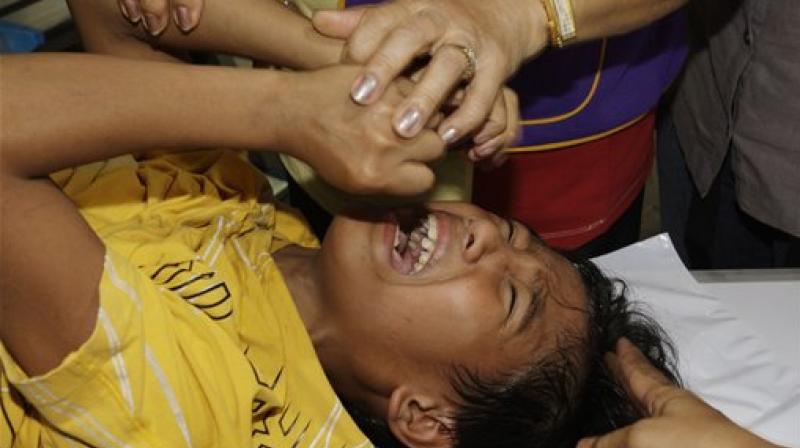Over 300 pre-teen boys undergo horrific mass circumcision in Philippines school
Circumcision is performed in the region as a part of their age-old tradition known as 'tuli'.

Marikina city, Luzon: Around 300 pre-teen boys were forced to undergo circumcision at a mass event in a school in Philippines' Markina city, according to a report in the Daily Mail.
The ritual, commonly referred to as 'tuli' in Philippines, is an age-old custom, wherein the foreskin of the penis is cut off for non-medical reasons. Circumcision is performed on those boys who are about to enter their teens.

A boy tries to control himself as doctors’ work on him during a free circumcision surgery. (Photo: AP)
Although painful and illegal, circumcision in many parts of the country is mandatory for young boys and those who do not undergo the ritual are often teased by peers.
The tradition of circumcision is generally associated with Islam and Judaism as in those religions young boys are forced to undergo the custom in the name of God.
 A group of boys lie on a makeshift operating table as nursing aid prepares them during a free circumcision surgery in Marikina city, east of Manila, Philippines. (Photo: AP)
A group of boys lie on a makeshift operating table as nursing aid prepares them during a free circumcision surgery in Marikina city, east of Manila, Philippines. (Photo: AP)
In Philippines, around 300 boys underwent the surgery as part of their transformation from young boys to adulthood and majority of the boys are Roman Catholics.
As a part of the ritual, the boys are encouraged to wear loose skirts to facilitate circumcision and the swelling that follows the ritual.
 A newly circumcised boy walks past a line of other boys waiting to be circumcised during a circumcision surgery event. (Photo: AP)
A newly circumcised boy walks past a line of other boys waiting to be circumcised during a circumcision surgery event. (Photo: AP)
Some boys cried in their mother's arms while some bit on to their shirts as the doctors and nurses performed the surgery. Young Filipino boys are often circumcised during their summer break holidays that last from March to May.
 Newly circumcised boys wait in line to receive free medicine during a circumcision surgery event. (Photo: AP)
Newly circumcised boys wait in line to receive free medicine during a circumcision surgery event. (Photo: AP)
Around five years ago, the Filipino city had also tried to register for Guinness Book of World Records for the largest number of circumcisions, but their application was rejected on the grounds of hygiene and risks.
"We would like to clarify that we do not, under any circumstance, monitor, endorse or recognise this type of record attempt," a spokesperson from Guinness World Records was quoted as saying.
In some rural parts of the country, the surgery is often performed by non-doctors using crude methods which can at times be more painful and unhealthy.

